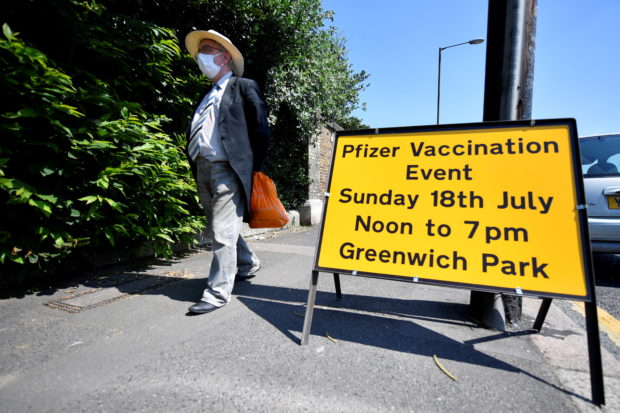English study finds 50-60% reduced risk of COVID for double-vaccinated

A person walks past a sign informing about a vaccination centre in Greenwich park, amid the coronavirus disease (COVID-19) outbreak, in London, Britain, July 18, 2021. REUTERS FILE PHOTO
LONDON — Fully-vaccinated people have an around 50 to 60% reduced risk of infection from the Delta coronavirus variant, including those who are asymptomatic, a large English coronavirus prevalence study found on Wednesday.
Imperial College London researchers said people who reported receiving two vaccine doses were half as likely to test positive for COVID-19, adjusting for other factors such as age, whether or not the people tested had COVID-19 symptoms.
Focusing on those who had COVID-19 symptoms, effectiveness rose to around 59%, according to the study, which covered a period when the Delta variant completely displaced the previously dominant Alpha variant.
The estimates, which did not break down effectiveness by vaccine, are lower than those reported by Public Health England for Pfizer and AstraZeneca’s shots.
The researchers said this was not surprising or worrying, given that PHE estimates were based on those who have symptoms and get tested, while the Imperial study is designed to pick up more people.
Article continues after this advertisement“We’re looking at effectiveness against infection amongst a random sample of the general population, which includes asymptomatic individuals,” Imperial epidemiologist Paul Elliot, who leads the study, told reporters, adding that even those who had symptoms in the study might not have got a test otherwise.
Article continues after this advertisement“So again, it’s a different bunch of people.”
The study found that the link between infections and hospitalizations, which had previously weakened, had started to reconverge, a move which coincides with the spread of Delta among younger people who may not be fully vaccinated.
PHE has said that Delta carries a higher risk of hospitalization, though vaccines offer good protection against severe disease.
The researchers said that overall, prevalence in unvaccinated people was 1.21%, three times higher than the 0.40% prevalence in fully vaccinated people, and that the viral load among people with COVID was also lower in vaccinated people.
Young people
The researchers were presenting the latest findings of Imperial’s REACT-1 prevalence survey, which showed there was a fourfold increase in infections in a month to reach 1 in 160 people in England.
The latest survey, conducted between June 24 and July 12, covers the time ahead of a peak in daily reported infections on July 17, and found that the rise was fueled by spread in younger people.
Imperial professor Steven Riley said that 5- to 24-year-olds accounted for 50% of all infections, even though they are only 25% of the population.
Schools have now shut for summer holidays, and cases have fallen from that peak despite legal coronavirus restrictions ending on July 19.
“We’ve shown that prior to the recent dip, young people were driving the infections,” Riley told reporters.
“These data support the idea that there is uncertainty about what might happen in September when schools return and we have increased indoor mixing, because of the patterns of infection that we saw driving the growth.”